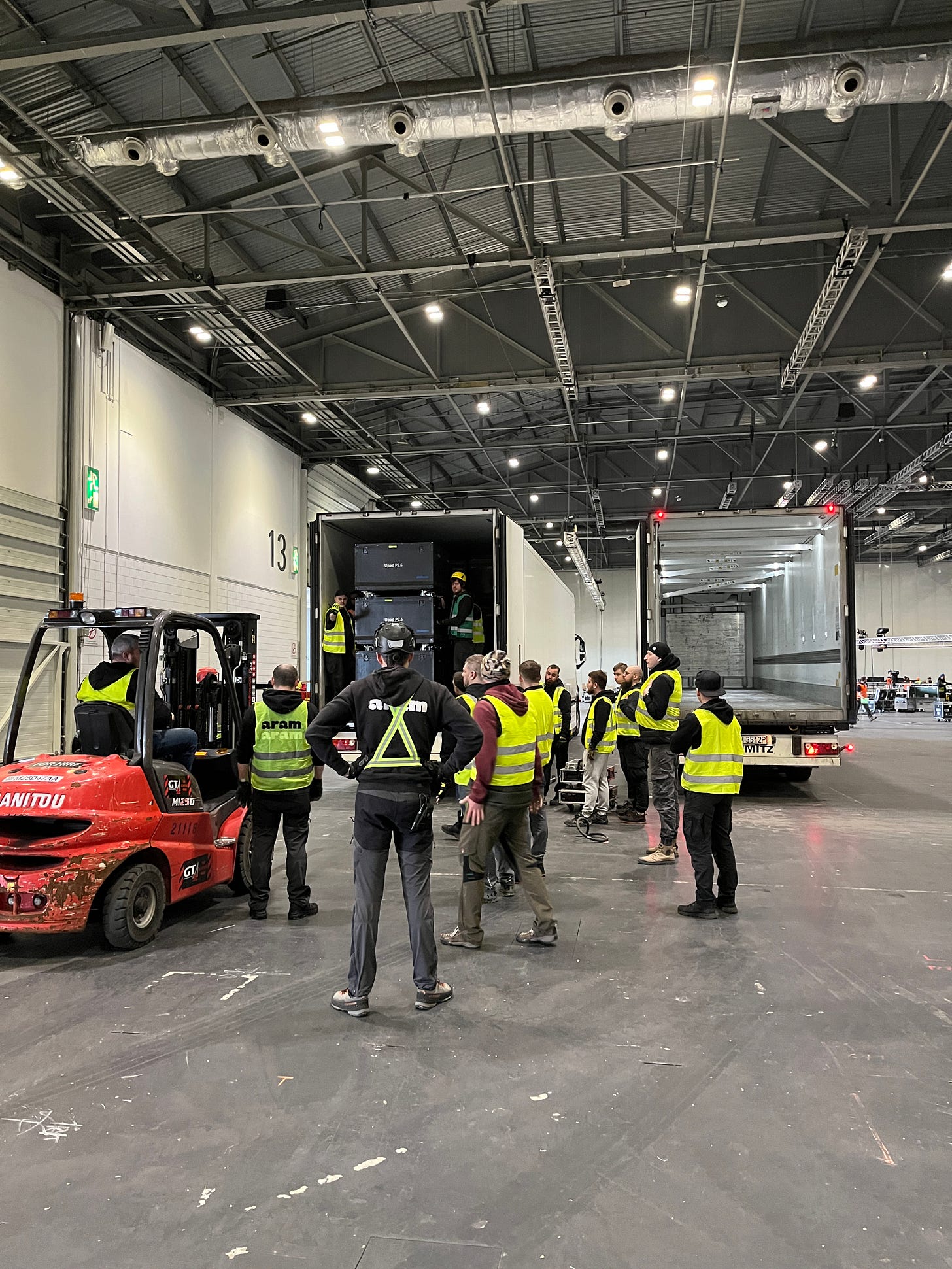The entertainment industry is a dazzling world of concerts, theater productions, festivals, and live events. Behind the scenes, stage technicians play a crucial role in making these productions come to life. While some countries offer dedicated schools for aspiring stage technicians, most people enter this exciting field through hands-on experience as stagehands. If you’re considering a career in stage technology, this guide explores the pathways, roles, and realities of life in this fascinating and often addictive profession.
Pathways to Becoming a Stage Technician
For many, the journey into stage technology begins as a stagehand—an entry-level position involving general labor tasks such as unloading trucks, setting up equipment, and assisting technicians. This role is a fantastic way to break into the industry, giving you an insider's view of concerts, festivals, and events while working alongside experienced professionals.
The Career progression
Stagehand:
A stagehand’s responsibilities include moving equipment, setting up basic gear, and helping build stages. It’s a physically demanding role but an incredible opportunity to learn the ropes and make industry connections.
Junior Technician:
As you gain experience and knowledge, you may transition into a junior technician role in a specific discipline (audio, lighting, video, or rigging). Here, you’ll focus on learning the technical skills required to operate and maintain equipment.
Senior Technician:
With more expertise and confidence, you can move up to a senior technician position. This role involves greater responsibility, including troubleshooting complex systems and mentoring junior technicians.
Chief or Department Head:
Chiefs oversee entire technical departments for productions, coordinating teams and ensuring everything runs smoothly.
Project Manager:
For those who excel in leadership and planning, becoming a project manager is a natural next step. Project managers oversee all technical aspects of production, from budgeting to execution, ensuring every detail is aligned with the client’s vision.
Why many stay in the industry for life
This job is more than just work—it’s a lifestyle. For those passionate about live events and the thrill of being behind the scenes, stage technology becomes addictive. The excitement of concerts, the camaraderie of the crew, and the satisfaction of seeing your hard work come to life are hard to replicate in other fields.
Many technicians stay in the industry for decades, moving from stagehand to senior roles and often mentoring the next generation of newcomers. The unique blend of creativity, problem-solving, and teamwork keeps people engaged and motivated for life.
The Roles and Disciplines of Stage Technology
1. Audio Technician
Responsibilities: Setting up microphones, calibrating sound systems, running cables, and mixing sound.
Skills Needed: A good ear, understanding of audio equipment, and problem-solving abilities.
Career Tip: Start by assisting with basic setups and learn how to operate mixing consoles over time.
2. Video Technician
Responsibilities: Managing LED screens, projectors, cameras, and video playback systems.
Skills Needed: Familiarity with video gear, troubleshooting signal flows, and handling content.
Career Tip: Ask to shadow experienced technicians during events and learn to operate playback devices.
3. Lighting Technician
Responsibilities: Installing and wiring lighting fixtures, running DMX cables, and maintaining equipment.
Skills Needed: Electrical knowledge, an eye for detail, and the ability to follow lighting plans.
Career Tip: Focus on mastering the setup and functionality of common fixtures before moving into creative design roles.
4. Rigging Technician
Responsibilities: Installing trusses, motors, and lifting systems while ensuring safety.
Skills Needed: Load calculation expertise, adherence to safety protocols, and physical endurance.
Career Tip: Get safety-certified and learn from experienced riggers to build your expertise.
The Realities of the Job
The Perks
Access to Events: Working in stage technology gives you insider access to concerts and festivals, making every day unique and exciting.
Team Spirit: The strong camaraderie among crew members creates lifelong friendships.
Career Growth: With dedication, the opportunities for advancement and skill development are immense.
The Challenges
Physically Demanding: The work involves long hours, heavy lifting, and sometimes working at heights.
Irregular Schedules: Events often mean late nights, weekends, and extended travel.
High Pressure: The need to meet tight deadlines and handle last-minute changes can be stressful.
Advice for aspiring Stage Technicians
Start as a Stagehand: Don’t underestimate the value of starting small. Being a stagehand is the best way to observe, learn, and get your foot in the door.
Be Passionate and Curious: Passion fuels growth. If you show enthusiasm, experienced technicians will mentor you.
Network: Building relationships is key in the entertainment industry. Let people know you’re eager to learn and grow.
Learn Constantly: Attend workshops, earn safety certifications, and stay updated on the latest gear.
Be Adaptable: Flexibility and quick problem-solving are critical skills for anyone working behind the scenes.
Conclusion
Becoming a stage technician is not just a career; it’s a thrilling journey into the heart of live events. Starting as a stagehand opens doors to incredible opportunities, allowing you to grow and specialize in various disciplines.
While the work is challenging and demanding, the sense of accomplishment and belonging keeps many in the industry for life. For those passionate about live entertainment and teamwork, this profession offers a deeply rewarding path filled with excitement, growth, and camaraderie.
If you are a stage technician, no matter what part of the world, feel free to submit to our CREW PORTAL








